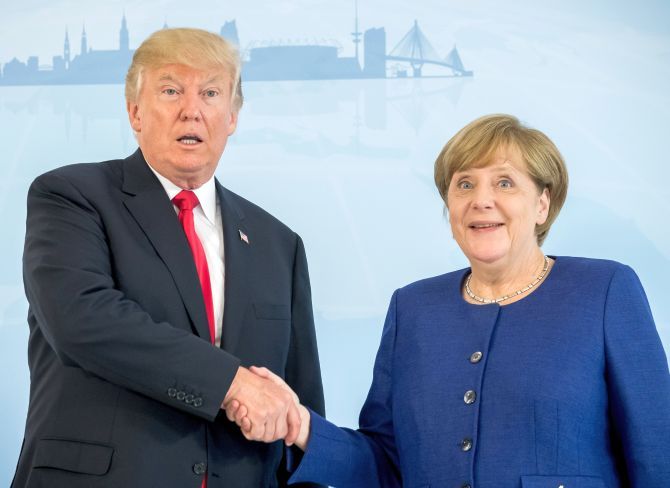 | « Back to article | Print this article |
How much are others responsible for the Trump presidency moving in the directions it has, asks T N Ninan.

By general consent, Donald J Trump as US president has been bad news most of the way.
Domestically, his tax policies are likely to lead to higher fiscal deficits and a massive increase in the national debt.
Economist Martin Feldstein, who is generally supportive of Republican administrations, has projected an 'exploding' US fiscal deficit in absolute numbers over the next decade, even as the public debt increases by 75 per cent.
For good measure, the US president's tariff policies have raised the risks of a trade war.
Internationally, treaties either concluded or in the works to build rules-based systems for boosting trade, limiting climate change and expanding the scope for international cooperation have been torpedoed.
Treaty allies, who have enjoyed decades of an American security umbrella, wonder when that cover will be folded and put away.
And a so-called 'natural ally' like India, which had been moving closer to the US, is now trying to rebuild ties with Russia and China.
While blaming Mr Trump for any and all of this, is there room for a counter-narrative?
Specifically, how much are other countries responsible for the Trump presidency moving in the directions that it has?
Consider the US threat of unilateral sanctions against other countries, under the Countering American Adversaries Through Sanctions Act (CAATSA).
Would such a domestic law have been quite so coercive if the European Union had built the euro as an alternative to the dollar?
If it had, countries could have avoided the fallout of sanctions under CAATSA (on Iran, say) by trading through the euro, thereby bypassing the dollar.
But the EU has refused so far to build international liquidity for the euro; more than half its own extra-EU trade is still paid for in dollars, not the euro. When it comes to foreign exchange reserves, the dollar is thrice as important as the euro.
Or consider the fate of Europe and East Asia, who have allowed the US to bear the primary responsibility for preserving security in its role as global policeman.
In doing so, they have saved money on defence budgets while the US has a defence budget that is more than the combined defence budgets of the next seven biggest spenders.
Germany spends just 1.2 per cent of its gross domestic product on defence, while the figure for the US is nearly thrice as much in relation to its GDP.
Japan's figure is about 1 per cent. Surely, these and other countries could have provided more of their own security needs and reduced their need for a US security umbrella.
Had they done so, the tremors today following the realisation that US security support against hostile action by Russia or China is not as cast-iron as was believed, could have been avoided.
Equally, China's once massive surplus on the current account has shrunk dramatically, even as the US current account deficit has halved over the past decade.
So the US demand that China buy much more from the US is medicine for yesterday's problem.
But China's currency policy and long-running theft of technology have for long been mostly immune to multilateral rules.
So why blame Mr Trump for trying bilateralism?
His approach may or may not work.
If China does buy more from the US, as Mr Trump demands, Beijing may simply divert orders from other countries to the US.
That would be trade-diverting, instead of trade expansion.
What does bear noting is that Germany's current account surplus, in relation to its GDP, is about as large as what China's once was (an astonishing 8 per cent).
Berlin has more to answer for than Beijing. So why be surprised when Mr Trump targets Germany?
Mr Trump's unilateral actions offend allies and raise the risk of a trade war, but he is right in saying that key economic issues have to be addressed.
Similarly, who can say that his targeting of India for exploiting visa rules, high tariffs in general and restrictive policies on imports is devoid of justification?